Where do SNP candidates stand on the key issues?
- Published
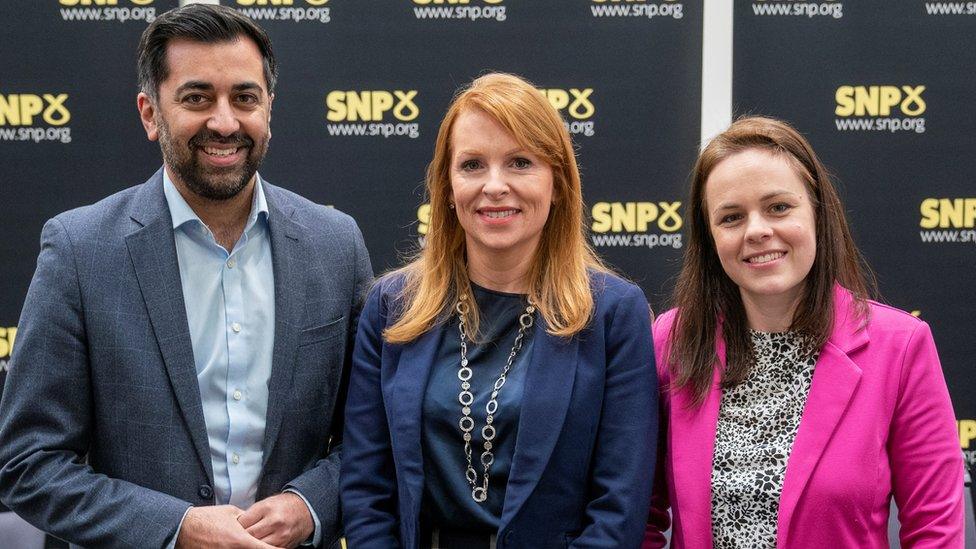
Three candidates - Ash Regan, Humza Yousaf and Kate Forbes, are standing in the contest to succeed Nicola Sturgeon as SNP leader and Scotland's first minister.
The winner will be decided by a vote of SNP members, with the result to be announced on 27 March.
Here is where the contenders stand on some of the key issues facing the country:
Independence
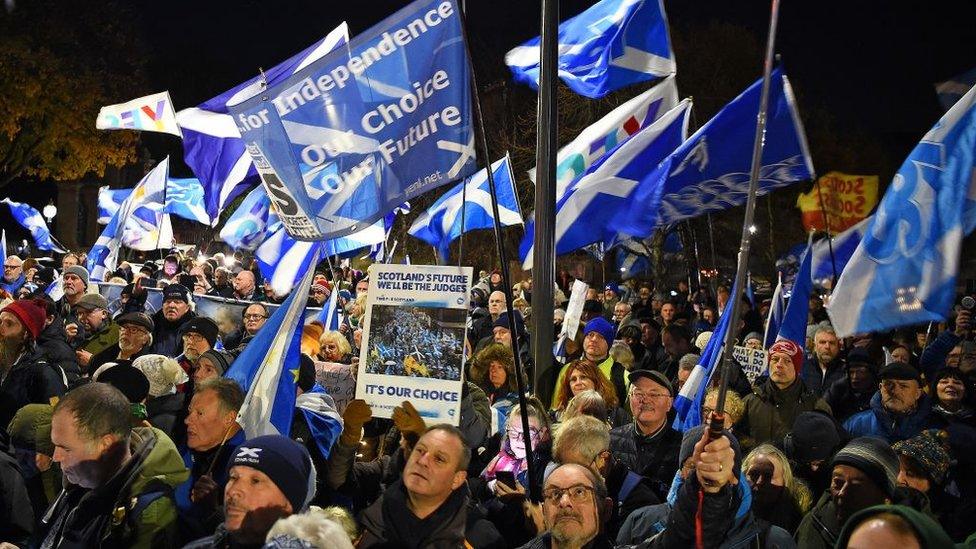
All three candidates have said they believe Scotland will become independent within the next five years.
Ash Regan has pitched herself as the candidate who is best placed to unite and reinvigorate the independence movement, and has accused her two opponents of being "wishy for washy" on the issue.
She wants to create a cross-party Independence Convention, and has said a majority of people voting for parties who back independence in any election would be enough to trigger negotiations with Westminster on Scotland leaving the UK through her "voter empowerment mechanism"
Kate Forbes has taken a more cautious approach, saying that she wants to build support for independence to a point where it is well beyond 50% by winning over people who are currently opposed to the idea.
Ms Forbes has said she would do this by using the existing powers of the Scottish Parliament to show that Scotland can flourish, and through "gentle persuasion, making the economic case and earning people's trust".
Humza Yousaf has also spoken of the importance of building support for independence by talking about policies rather than process, but has said he could consider a snap Holyrood election as part of a strategy to secure independence.
He said: "We have got to inspire people with a vision for independence. We have to make sure that we're not obsessing about Section 30s and de facto referendums because people just don't get inspired by that."

Gender reform
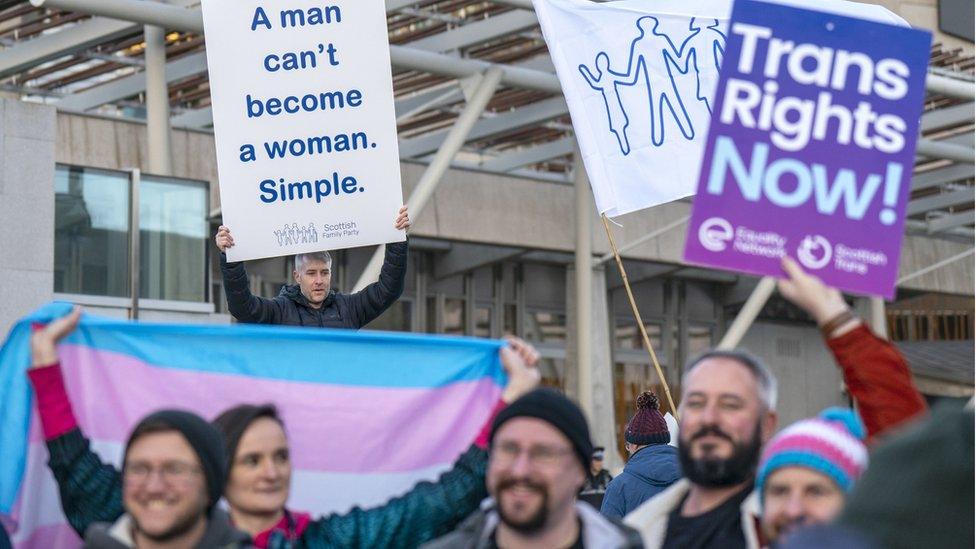
Mr Yousaf is the only candidate to have said he would challenge the UK government's block on the gender recognition reforms in the courts and to have backed the proposals in the final vote last December.
The health secretary has warned the SNP against a "lurch to the right" on social issues, which he said could see it "lose vast swathes of support" and make it "very possible we will not be electable".
But he has faced accusations - which he strongly denies - that he "ducked" the vote that legalised gay marriage in 2014 because of religious pressure from a Glasgow mosque.
Ash Regan quit as the Scottish government's community safety minister over the gender reforms, saying that her conscience would not allow her to support the self-identification plans.
She is a long-standing critic of the proposals and has said she would "never vote for anything that would put women and girls in danger".
Ms Regan has also made clear she would not challenge the UK government block in the courts as "I don't believe we would win".
Kate Forbes did not take part in the final vote on the gender reforms as she was on maternity leave, but was one of the SNP politicians who had previously signed an open letter to Nicola Sturgeon highlighting concerns over the legislation.
She has said she would not have supported the reforms if she had been in parliament, and it seems unlikely that she would launch a legal challenge to the UK government's veto.
Ms Forbes, who is a member of the Free Church of Scotland, has faced fierce criticism from senior SNP figures including Deputy First Minister John Swinney over her opposition to gay marriage and her socially conservative views on issues such as abortion and having children outside marriage.

The economy
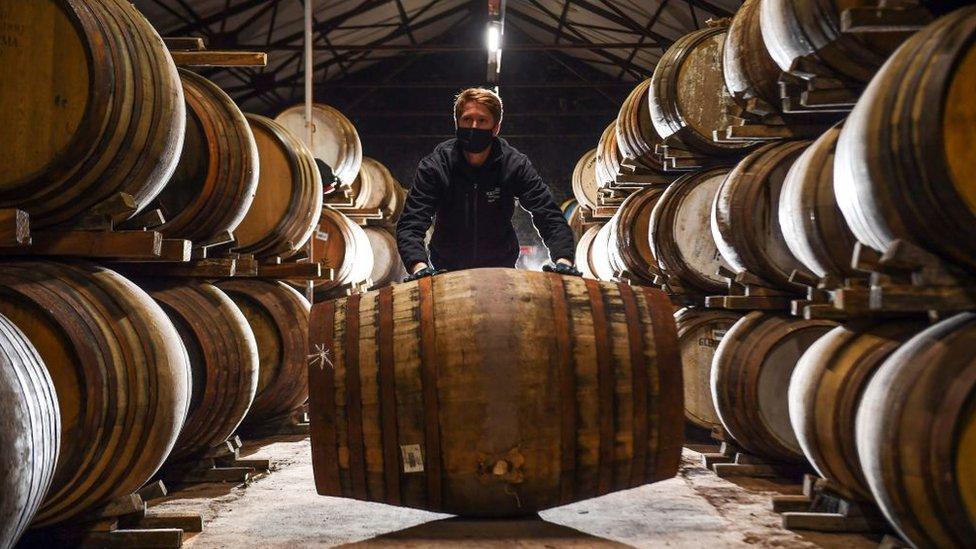
Kate Forbes has said she would not raise income tax for higher earners and would instead focus on growing the economy and expanding the tax base by cutting red tape for businesses - including a pause on the deposit return scheme - and improving transport infrastructure.
The finance secretary was on maternity leave when the Scottish government raised income tax rates for higher earners, and has said she wants Scotland to be a high growth economy "so that high tax is no longer required".
She has argued that the only way of cutting poverty is "make the Scottish economy more prosperous because that creates more, better jobs and raises more funding to reinvest in front line services".
Humza Yousaf has outlined a plan to fast-track the expansion of childcare to one and two-year-olds, which he believes would be a game changer for working families and the wider economy. The UK government has unveiled a similar plan for England.
He backed the recent income tax rises, and argues that the "failed economic consensus of both Westminster parties has given Scotland the worst of both worlds - low growth and low productivity, combined with unacceptably high poverty and inequality".
He has said he wants Scotland to "chart a different course" and to create a "wellbeing economy" that "puts the equality, happiness and health of all Scotland's citizens at its heart" and which would see trade unions and workers have a greater input into economic policy and has said that small businesses could be excluded from the deposit return scheme for the first year.
Ash Regan wants a pause to the deposit return scheme, which aims to improve recycling rates for single-use drinks containers but has been at the centre of controversy over its impact on smaller firms such as craft breweries.
She has said the scheme was an example of the Scottish government failing to listen to what people were saying, and that some businesses "just don't know how they are going to make this work".
Ms Regan has also said that many of the issues facing the Scottish economy, including child poverty rates, cannot be fixed under devolution and that the country needs the full economic levers of independence.

Health and social care
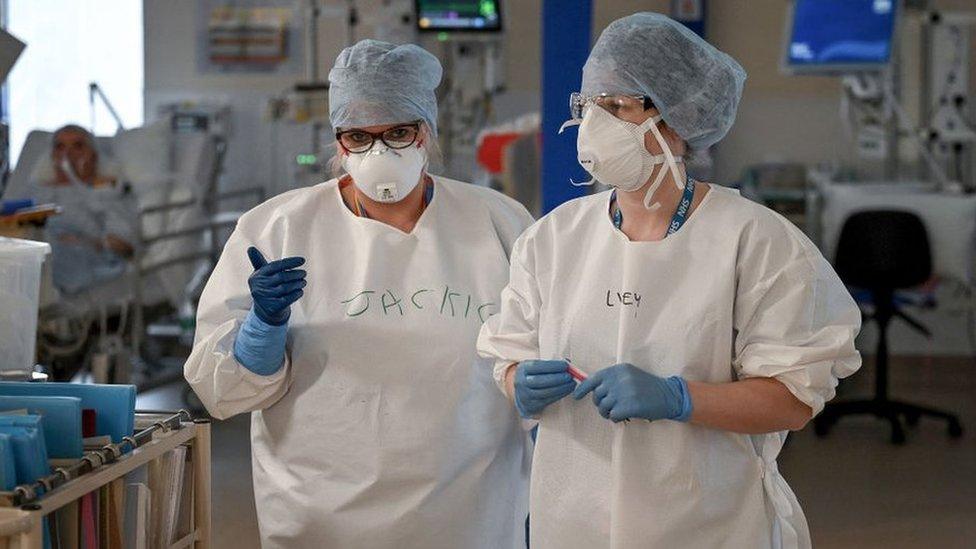
Humza Yousaf - who is currently the country's health secretary - has said he would be open to changing controversial plans to create a national care service if he becomes first minister by working with critics of the scheme in an attempt to find compromise.
His supporters say that Mr Yousaf has the experience of guiding the NHS through the aftermath of the Covid pandemic, and has managed to avoid the strikes by health workers that have hit other parts of the UK.
He apologised for soaring NHS waiting times during the recent BBC Scotland TV debate, telling an audience member whose husband was facing a wait of between three and six years for knee surgery that "not just myself as health secretary, but the entire government is focused on reducing those waiting lists".
Ash Regan has said that improving the health service would be her main objective if she becomes the country's next first minister.
She wants to hold a summit of frontline health workers to identify and then tackle the issues facing NHS staff.
Ms Regan said: "There has been too much focus on targets and goals - the nurses and midwives I've met during this leadership election are telling me they are exhausted, the NHS has been running on goodwill for too long, it is time for change".
Kate Forbes has said she wants to rethink the national care service plans because the scheme must have the confidence of everyone who delivers and uses it if it is to be successful.
She has also proposed setting up an inquiry to look at giving the NHS a radical overhaul, but has stressed that it must remain free at the point of need.
Ms Forbes said: "We shouldn't be shy of discussing the need for reform in order to ensure that our NHS is prepared, and not just for the next year, but it's still providing treatment free at the point of need in the next few decades."

Education
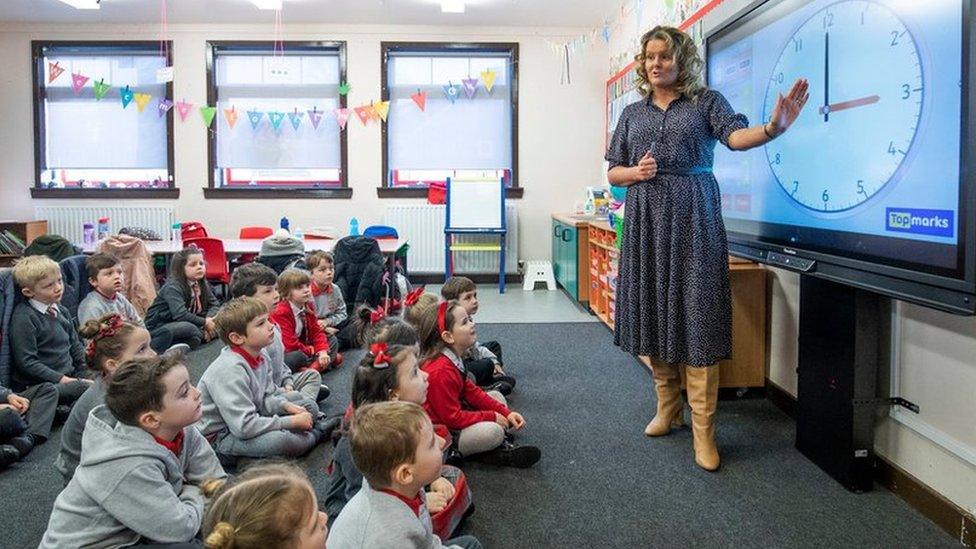
Kate Forbes has said she wants to simplify the education system and "empower" teachers and other frontline staff by reducing the burden on them, giving them greater freedom over staffing and resources and allowing them to get on with the job of teaching children.
She said: "What I want to see is an education system that teachers our children and that ensures that when they leave school they are ready for further education or they are ready for the workplace".
Ms Forbes has also highlighted the importance of cutting poverty levels, saying that some children in Scotland are arriving at school "too hungry to learn".
Ash Regan believes many teachers are having to spend too much time dealing with bureaucracy and "filling in forms" rather than teaching, and wants to free them up from that.
She has also said that some schools are expecting teachers to also effectively be psychologists and social workers.
Ms Regan has said that some schools could therefore have an in-house social worker "which could take that away from the teachers and free them up just to teach, which is obviously what they do best".
Humza Yousaf has said he wants to reduce inequality and for "every single child in Scotland to have the same opportunities both my girls have".
He has admitted that the Scottish government has "much further to go" in closing the attainment gap between the wealthiest and most deprived pupils.
Mr Yousaf wants to expand the provision of free school meals, breakfast clubs and after-school clubs, with a particular focus on those areas with the highest deprivation, and to improve the early diagnosis of autism and learning difficulties.